- Top Employee Onboarding Software
- Why Use Employee Onboarding Software?
- Key Features of Effective Onboarding Software
- How To Choose The Right Onboarding Software?
- Which is the Best Onboarding Software?
- Frequently Asked Questions (FAQs)
- What Is Upskill And Reskill?
- Difference Between Reskilling And Upskilling
- Upskilling for Workplace Advancement
- Reskilling for Career Transformation
- Crafting Successful Upskill and Reskill Strategies
- Upskill And Reskill Strategizing: Things to Keep in Mind
- Measuring the Impact of Skill Development Initiatives
- Frequently Asked Questions
- What’s a Skill Gap?
- Employee Skill Gap Analysis: Why Do We Need It?
- How To Conduct Employee Skill Gap Analysis?
- Addressing Skill Gaps Through Training and Hiring
- Utilizing Skills Gap Analysis for Strategic Planning
- Leveraging Employee Skill Gap Analysis: Things To Keep In Mind
- Frequently Asked Questions
- Transformative Role of AI in Talent Acquisition
- Impact of AI on Business Recruiting
- Overcoming Challenges in AI-Driven Talent Acquisition
- Starting with AI in Talent Acquisition
- Future Landscape of AI in Talent Acquisition
- Frequently Asked Questions
- HR In The Hot Seat - Challenges With Evolving Workforce
- Mastering Effective HR Management: Tips For Overcoming Challenges
- Summing Up
- The Future of HR: Key Trends for 2024
- Skill-Based Hiring
- Prioritizing Employee Experience, Engagement & Well-being
- AI-Empowered Workforce Evolution and Its Impact
- Taking Diversity, Equity, and Inclusion Beyond Mandates
- Hybrid and Remote Work
- Embracing the Gig Economy and Blended Workforce
- Transparent HR Practices
- Climate Change Adaptation in HR Practices
- Leveraging HR Analytics for Data-Driven Decisions
- Continuous Learning & Development to Improve Productivity
- The Office Buzz in 2024
- Bottom Line - HR Operating Model Needs A Shift
- Importance and Impact of Recognizing Employee Birthdays
- Professional Birthday Wishes for Employees (All Experience Levels)
- Personalized Birthday Wishes for Employees in Different Roles
- Fun Birthday Wishes for Employees (with Templates)
- Birthday Wishes for Remote Employees
- Heartfelt Birthday Wishes for Employees
- Belated Birthday Wishes for Employees
- Simple & Sweet Birthday Wishes for Employees
- Celebrating Employee Birthdays: Ideas and Traditions
- Tips and Ideas for Sending Birthday Wishes to Employees
- Closing Thoughts
- Frequently Asked Questions
- What Is An Employee Referral?
- Benefits of Implementing Employee Referral Programs
- Setting Up an Effective Employee Referral Program
- Employee Referral Email
- Employee Referral Scheme
- Overcoming Challenges of Employee Referrals
- Companies with Best Employee Referral Programs
- Employee Referral Programs: Best Practices
- Closing Thoughts
- Frequently Asked Questions (FAQs)
- Importance of Team Building Activities
- Types of Team Building Activities
- Outdoor Team Building Activities for Employees
- Indoor Team Building Activities for Employees
- Easy Team Building Activities for Remote Employees
- Team Building Activities For New Employees (Icebreakers)
- Fun Team Building Activities for Different Goals
- To Boost Communication and Collaboration
- To Reduce Stress Levels and Promote Well-being
- Aligning Team Purpose and Values with Strategic Activities
- Final Remarks
- Frequently Asked Questions
- Importance of Employee Appreciation Quotes
- Work Appreciation Quotes for Employees
- Employee Appreciation Quotes for Hard Work Recognition
- Employee Appreciation Quotes for Teamwork and Collaboration
- Appreciation Quotes for Celebrating Employee Anniversaries and Milestones
- Employee Appreciation Quotes for Strong Work Ethics
- Employee Appreciation Quotes for Project & Goal Completion
- Employee Appreciation Quotes for Quality of Work
- Employee Appreciation Quotes for Creativity and Innovation
- Appreciation Quotes for Managers
- Peer-to-Peer Employee Appreciation Quotes
- Appreciation Quotes for Employees Leaving the Company
- Employee Appreciation Quotes for Thoughtful Gestures
- Funny Employee Appreciation Quotes
- Short Employee Appreciation Quotes
- Employee Appreciation Quotes for Different Roles
- Employee Appreciation Quotes for Senior Leadership
- Creative Ways to Use Employee Appreciation Quotes
- Summary
- Frequently Asked Questions (FAQs)
- What is Employee Satisfaction?
- Importance of Employee Satisfaction
- Objectives of Employee Satisfaction
- Employee Satisfaction vs. Employee Engagement
- Key Reasons for Employee Dissatisfaction
- Strategies for Improving Employee Satisfaction
- Ways to Measure Employee Satisfaction
- Best Practices for High Employee Satisfaction
- Final Remarks
- Frequently Asked Questions (FAQs)
- How to Craft Effective Employee Appraisal Comments
- Key Areas to Focus in Performance Review
- Comments On Hard Work & Dedication
- Assessing Interpersonal Skills
- Evaluating the Ability to Collaborate & Work in Teams
- Gauging Punctuality
- Commenting on Communication Style
- Reviewing Time Management and Productivity
- Leadership in Performance Appraisals
- Assessing Creativity & Innovation
- Evaluating Problem-Solving Abilities
- Recognizing Flexibility and Dependability in Reviews
- Employee Appraisal Comments for Different Roles
- Summary
- Frequently Asked Questions (FAQs)
- Employee Grievance Meaning
- Importance of Employee Grievance Process
- Types of Workplace Grievances
- Reasons for Employee Grievances
- Employee Grievance Procedure
- Steps in the Employee Grievance Handling Process
- Employee Grievance Form Example
- Final Remarks
- Frequently Asked Questions (FAQs)
- What is Company Culture?
- Importance of Company Culture
- Types of Company Culture
- Factors Contributing to Organizational Culture
- Assessing & Developing Corporate Culture
- Company Culture - It’s not just Perks or Feels
- Good Company Culture Examples
- Developing Company Culture: Best Practices
- Closing Thoughts
- Frequently Asked Questions (FAQs)
- What is Employee Empowerment?
- Benefits of Empowering Employees
- Employee Empowerment vs. Micromanagement
- Strategies for Effective Employee Empowerment
- Role of Managers in Fostering Empowerment
- Organizational Structure Supporting Empowerment
- Overcoming Barriers to Employee Empowerment
- Frequently Asked Questions (FAQs)
- What is Employer Branding?
- Importance of Employer Branding Strategy
- How to Build an Employer Branding Strategy?
- Strategies for Building a Strong Employer Brand
- How to Measure and Boost Your Employer Branding Success?
- Examples of Strong Employer Brand Strategy
- Best Practices for an Effective Employer Branding Strategy
- Closing Thoughts
- Frequently Asked Questions (FAQs)
- What are Employee Wellness Programs?
- Importance of Employee Wellness Programs
- Examples of Employee Wellness Programs
- Real-Life Examples of Corporate Wellness Programs
- Strategies for Encouraging Participation
- Supporting Diverse Employee Needs
- Creating Comprehensive Wellness Programs
- Measuring the Impact on Business and Employees
- Closing Thoughts
- Frequently Asked Questions (FAQs)
- What is Talent Management?
- Developing a Winning Talent Management Strategy
- Models and Frameworks
- Tips for Framing Effective Talent Management Strategy
- Looking Ahead: Recent Trends in Talent Management
- Frequently Asked Questions
- Role of AI in HR: Addressing Common Challenges
- Artificial Intelligence in HR Processes
- AI Tools for HR Functions
- How to Adopt AI in HR?
- Addressing Challenges of AI in HR
- Ethical and Responsible AI Use
- The Future of AI in HR
- Closing Thoughts
- Frequently Asked Questions
- What is Performance Management?
- Elements of Effective Performance Management
- Performance Management Cycle
- Differentiating Performance Management
- Benefits of Performance Management With Examples
- Challenges faced in Performance Management and their Solutions
- Future Trends in Performance Management
- Frequently Asked Questions
- Changing Role of HRM
- Changing Role Of HR Manager
- Technology and the Changing Role of HRM
- The Rise of AI and Machine Learning in HR
- Mobile Technology's Impact on HR Practices
- The Significance of People Analytics in HR
- Navigating the Future of HR Technology
- Final Remarks
- Frequently Asked Questions
- Compensation Management Meaning
- Compensation Types
- Breaking Down The Compensation Management Process
- HR Software for Compensation Management
- Current Trends in Compensation Management
- Frequently Asked Questions
- Defining Flexible Work Arrangements
- Flexible Working: Advantages for Businesses
- Challenges of Flexible Work Arrangements
- Crafting Flexible Working Practices
- Types Of Flexible Work Arrangements
- Comparing Flexible Work Arrangements
- Real-Life Examples of Flexible Work Arrangements
- Final Remarks
- Frequently Asked Questions
- Conflict Resolution Meaning
- Conflict Origins
- Tried & Tested Conflict Resolution Strategies
- Methods of Conflict Management at Workplaces
- Conflict Resolution Strategies: Top Management Tips
- Summary
- Frequently Asked Questions
- Career Development Meaning
- Career Development Plan for Employees
- Career Development in HRM: Growth Ideas For Employees
- Issues in Career Development and Their Solutions
- Closing Thoughts
- Frequently Asked Questions
- Understanding Compensation
- Exploring Benefits
- Difference between Compensation and Benefits
- Compensation & Benefits Structure
- Final Remarks
- Frequently Asked Questions
- Defining Recruitment in HR Practices
- Exploring Talent Acquisition in HR
- Understanding Talent Acquisition vs Recruitment
- When to Recruit or Acquire Talent
- Talent Acquisition vs Recruitment: Responsibilities
- From Recruitment To Talent Acquisition
- Closing Thoughts
- Frequently Asked Questions
- Work Culture Meaning
- Types of Work Cultures
- Components of Culture
- Best Work Culture Examples Set By Top Companies
- Creating a Positive Work Culture
- Closing Thoughts
- Frequently Asked Questions
- Defining Learning vs Development
- Importance of Learning and Development
- L&D Activities for Employees
- Choosing the Right L&D Activities
- Crafting an Effective L&D Strategies
- Aligning L&D Strategy with Business Goals
- Designing Engaging Learning Journeys
- Learning and Development Process: KPIs
- ROI in Learning and Development
- Emerging Trends in L&D
- Closing Thoughts
- Frequently Asked Questions
- What Is Leadership Development?
- Key Skills for Leaders
- How To Develop Leadership Skills in Organizations?
- What Is A Leadership Development Program?
- How To Develop A Leadership Development Program?
- Example of A Leadership Development Plan
- Benefits of Leadership Development Training
- Frequently Asked Questions
- Defining Diversity Training
- Importance of Diversity Training
- What are the Types of Diversity?
- Types of Diversity Training Methods
- Diversity Training Activities
- Choosing A Diversity Training Program
- How to Implement Diversity Initiatives
- Best Diversity Training Programs (Real-Life Examples)
- Improving the Effectiveness of Diversity Training
- Tracking and Evaluating the Results of DE&I Training Efforts
- Essential Elements for Successful Diversity Training
- Closing Thoughts
- Frequently Asked Questions
- Defining Occupational Health & Safety
- Evolution of Workplace Health and Safety
- Identifying Common Workplace Hazards
- Global Impact on Occupational Health & Safety
- Managing Employee Health and Safety Risks
- Occupational Health and Safety Problems
- Future of Occupational Health and Safety
- Frequently Asked Questions
- Employee Orientation Defined
- Employee Onboarding Explained
- Orientation and Onboarding: Understanding the Difference
- Importance of Orientation and Onboarding
- Crafting Comprehensive Integration Strategies
- Quick Tips for Orientation and Onboarding
- Frequently Asked Questions
- What is HR Metrics?
- Importance of HR Metrics
- HR Metrics Examples in Recruitment
- HR Metrics Examples in Employee Retention
- HR Metrics Examples in Revenue
- Other Common HR Metrics
- Soft HR Metrics Example
- HR Metrics Formula
- Utilizing HR Metrics Effectively
- Future of HR Metrics
- Summary
- Frequently Asked Questions
- Defining Decision Making Process
- Key Concepts In Decision Making
- Decision Making & Problem Solving
- Tips For Improving Decision Making Skills
- Selected Practice Questions & Answers
- Conclusion
- Frequently Asked Questions (FAQs)
- A case(s) of miscommunication
- The devil is in the (resume) details
- One for the complaints!
- What is an Exit Interview?
- Benefits of Exit Interviews to an Organization
- How to Conduct Exit Interviews?
- Exit Interview: Sample Questions to Ask
- Overcoming Challenges of Exit Interviews
- Exit Interviews: Best Practices
- Closing Thoughts
- Frequently Asked Questions
- Technology in the Workplace
- Benefits of Tech Integration
- Technology in the Workplace: Key Functions
- How Technology Normalized Remote Work
- Workplace Technology: Top Tools and Software
- Steps for Effective Technology Implementation
- Overcoming Tech Implementation Challenges
- Ethical Considerations in Tech Use
- Keeping Pace with Tech Trends
- Closing Thoughts
- Frequently Asked Questions
- What is Ethical Leadership?
- Principles of Ethical Leadership
- Difference between Ethics and Integrity
- Importance of Ethical Leadership
- Ethical Leadership in Practice
- Overcoming Challenges
- Frequently Asked Questions
- Embracing Change Management
- Mastering People Analytics
- Enhancing Stakeholder Relationships
- Navigating Diversity, Equity & Inclusion
- Upholding Ethics and Data Privacy
- Developing Critical Thinking
- Advancing Negotiation Techniques
- Fostering Inter-departmental Collaboration
- Building Resilience in HR
- Frequently Asked Questions
- What is Mental Health?
- Benefits of a Mentally Healthy Workforce
- Prioritising Mental Health: Creating a Culture of Support
- Final Remarks
- Frequently Asked Questions
- Gen Z vs Millennials - What is the difference?
- Retain and Engage Gen Z Employees: Need and Strategies
- Strategies to Retain and Engage Gen Z Employees
- Rethinking Requirements
- Final Remarks
- Frequently Asked Questions
- Understanding Millennial Leadership Needs
- Key Leadership Skills for Millennials
- How To Develop Millennial Into Leaders
- Additional Strategies to Develop Leaders
- Learning Preferences of Millennials
- Benefits of Investing in Millennial Leaders
- Closing Thoughts
- Frequently Asked Questions
- Understanding Fluff
- Examples of Interview Fluff
- Identifying Interview Fluff
- Addressing Interview Fluff
- Seeing Through the Fluff
- Frequently Asked Questions
- What is the Gender Pay Gap?
- Is the Gender Pay Gap Real?
- Factors Affecting the Gender Pay Gap
- How Age Impacts Women’s Earnings
- The ‘Motherhood Penalty’
- Education's Role in Wage Differences
- Racial and Ethnic Disparities in Pay
- Closing the Gender Gap
- Frequently Asked Questions
- Top Weirdest Late-To-The-Office Excuses
- The Fine Art of Balancing Wit and Wisdom in HR
- Understanding Social Media Recruiting
- Crafting Your Social Media Recruitment Strategy
- Implementing Your Strategy Effectively
- Popular Platforms for Recruitment
- Navigating the Downsides of Social Media Recruiting
- Measuring Success and Adjusting Strategy
- Summary
- Frequently Asked Questions
- Who Is A High Potential (HIPO) Employee?
- Characteristics of A High Potential (HIPO) Employee
- High Potential Employee Identification
- Grooming High Potential Employees
- Why High Potential Employees Leave
- How Do You Retain High Potential Employees?
- High Potential Employee Development: Best Practices
- Closing Thoughts
- Frequently Asked Questions
- What is Digital Fluency?
- Why Digital Fluency Matters?
- Difference between Digital Literacy and Digital Fluency
- Key Components of Digital Fluency
- Achieving Digital Fluency
- Overcoming Challenges
- Future of Workforce Digital Fluency
- Frequently Asked Questions
- What is Loud Quitting?
- Pros and Cons of Loud Quitting
- Reasons Behind the Trend
- Analyzing the Impact
- How HR Can Navigate the Loud Quitting Uproar
- Preventive Strategies
- Closing Thoughts
- Frequently Asked Questions
- Defining Emotional Intelligence in HR
- Why Emotional Intelligence Matters for HR Leaders
- How To Build Emotional Intelligence in HR
- Integrating EQ into HR Practices
- Impact of EQ on Company Culture
- Emotional Intelligence in HR: Major Challenges
- Final Remarks
- Frequently Asked Questions
- Understanding Internal Job Posting
- Internal Job Posting: Pros and Cons
- The Internal Job Posting Process
- Writing Effective Ads for Internal Job Posting
- Strategies for Success of Internal Job Posting
- Summary
- Frequently Asked Questions
- Understanding Workplace Bias
- Common Types of Bias in HR
- Closing Thoughts
- Frequently Asked Questions
- What is a Dry Promotion?
- Dry Promotion: Pros and Cons for Companies
- Impact of Dry Promotion on Employee Retention
- Preventing Talent Loss After Dry Promotions
- Closing Thoughts
- Frequently Asked Questions
- What Is A Stay Interview?
- Importance Of Stay Interviews
- Benefits And Challenges Of Stay Interviews
- Planning And Conducting Stay Interviews
- Stay Interviews: 20 Sample Questions To Ask
- Best Practices For Effective Stay Interviews
- Summary
- Frequently Asked Questions
- Who Is A Boomerang Employee?
- Reasons For Returning
- Benefits Of Hiring Boomerang Employees
- Challenges Of Rehiring
- Interviewing Boomerang Candidates: Sample Questions
- Enhancing The Hiring Process
- Making Informed Decisions
- Final Remarks
- Frequently Asked Questions
- Talent Pipeline Meaning
- Significance of Talent Pipelines
- Advantages of a Talent Pipeline
- Building a Talent Pipeline
- Maintaining a Talent Pipeline
- Attracting Top Talent
- Implementing the Strategy
- Frequently Asked Questions
- What is Micromanagement?
- Recognizing Micromanagement
- Leadership versus Micromanagement
- Keeping Micromanagement in Check
- Beyond Micromanagement
- Summing Up
- Frequently Asked Questions
- Recognizing Signs Of A Bad Hire
- Understanding The Impact On Teams
- Dealing With A Bad Hire
- Preventing Future Bad Hires
- Closing Thoughts
- Frequently Asked Questions
- Defining Neurodiversity
- Importance of Neurodiversity in the Workplace
- Moving Towards Inclusive Environments
- Final Remarks
- Frequently Asked Questions
- Understanding the Generation Gap
- Multigenerational Workforce: Debunking Stereotypes
- Strategies for Bridging the Gap
- Benefits of a Multigenerational Workforce
- Final Remarks
- Frequently Asked Questions
- Defining Productivity Theatre: All Show, No Go
- 5 Key Drivers of Fake Productivity
- Solutions to Combat Productivity Theatre
- Summary
- Frequently Asked Questions
- Defining Grumpy Staying
- Why do Grumpy Stayers not Leave?
- Recognizing the Signs
- Exploring the Causes
- Understanding the Impact
- Addressing the Issue
- Taking Action: Addressing Grumpiness with Empathy
- After the Conversation
- When Grumpy Staying Continues
- Closing Thoughts
- Frequently Asked Questions
- The Rationale Behind Office Peacocking
- Impact on Company Culture
- Impact on Employees
- Case Studies: Examples of Office Peacocking
- The Downside: Potential Pitfalls of Office Peacocking
- Practical Tips for Implementing Office Peacocking
- Frequently Asked Questions
- 13 Common Mistakes Young Managers Make
- Strategies To Avoid Mistakes (Individual Growth)
- How Young Managers Can Boost Teamwork
- Learning From Errors
- Summary
- Frequently Asked Questions
- Understanding Great Regret - What causes the shift shock?
- Impact of Great Regret
- How can HR help make the situation better?
- Closing Thoughts
- Frequently Asked Questions
- Understanding the HR Budget
- Key Components of an HR Budget
- Preparing an HR Budget Step-by-Step
- Importance of HR Budgeting in Management
- Final Remarks
- Frequently Asked Questions
- What are Pre-Employment Assessments?
- Importance of Pre-Employment Testing
- Types of Pre-Employment Assessments
- 15 Tips for Creating Effective Pre-Employment Assessments
- Closing Thoughts
- Frequently Asked Questions
- Exploring the Productivity Paradox
- Understanding the Impact of Solow Paradox
- Productivity Paradox: Why it Matters for Recruiters & HRs
- Identifying Causes and Challenges
- Strategies for Enhancing Productivity
- AI & the Modern-Day Productivity Paradox
- Beyond Technology: Building a Productive Workforce
- Summary
- Frequently Asked Questions
- Understanding the Great Reshuffle 2.0
- Preparing Leaders for the Change
- HR’s Role in Handling Great Reshuffling 2.0
- The Way Ahead
- Frequently Asked Questions
- Definition Of Managerial Grid
- Managerial Grid Theory Explained
- Application Of Managerial Grid
- Criticisms And Limitations
- Evolution And Contemporary Perspectives
- Integrating Managerial Grid With Other Models
- Practical Steps For Implementing Managerial Grid
- Conclusion
- Frequently Asked Questions
- Understanding Skills Taxonomy
- Why do we Need Skills Taxonomy?
- Benefits of Skills Taxonomy
- Components of Skills Taxonomy
- Building a Skills Taxonomy: A Step-by-Step Guide
- Skill Taxonomies vs Intelligence Tools
- Closing Thoughts
- Frequently Asked Questions
- Definition Of Team Building
- Stages Of Team Development
- Top 10 Strategies For Effective Team Building
- Team Building Activities
- Best Practices For Effective Team Building
- Setting Team Building Objectives
- Challenges In Team Building
- Conclusion
- Frequently Asked Questions (FAQs)
- Defining Job Shadowing
- Unpacking the Benefits
- Setting Up the Experience
- Job Shadowing vs Internship
- Dos and Don'ts for HR Professionals
- Closing Thoughts
- Frequently Asked Questions
- Employee Journey Mapping: Meaning & Importance
- Stages of the Employee Journey
- Steps for Effective Mapping
- Employee Journey Map: Where does it begin?
- Employee Journey Map: Template
- Best Practices & Tips
- Summary
- Frequently Asked Questions
- Why are Performance Appraisals needed?
- Evolution of Performance Management
- Modern Performance Practices
- Benefits of Modern Performance Appraisals
- The Future
- Frequently Asked Questions
- Is Experience the Sole Indicator of Success?
- Why Hire Inexperienced Talent?: Key Advantages
- Skills to Look For in Inexperienced Talent
- Challenges and Considerations in Hiring Inexperienced Talent
- Final Remarks
- Frequently Asked Questions
- What is a Company Retreat?
- Company Retreat Ideas: Team-Building & Exploration
- Relaxation and Celebration
- Planning Your Retreat: Things to Keep in Mind
- Closing Thoughts
- Frequently Asked Questions
- Understanding HR Forecasting
- HR Forecasting Key Concepts
- Steps for Implementing HR Forecasting
- Common HR Forecasting Methods
- Closing Thoughts
- Frequently Asked Questions
- What is ESG?
- HR and ESG - Why Care?
- ESG in HR Strategy
- Challenges for HR
- Future of ESG in HR
- Frequently Asked Questions
- Defining the Great Betrayal
- Reasons for Its Spread
- Impact on Workers
- Impact on Corporations
- Rebuilding Trust & Valuing Employees
- Closing Thoughts
- Frequently Asked Questions
- Importance of Clear Expectations
- Setting Expectations Early
- Communicating Expectations Effectively
- Differentiating Expectations
- Reviewing and Adjusting Expectations
- Summing Up
- Frequently Asked Questions
- Understanding KRA Frameworks And Models
- KRAs vs KPAs and KPIs
- Monitoring and Tracking KRAs
- KRAs in Various Roles
- Impact of KRA Frameworks and Models on Organizational Success
- Frequently Asked Questions
- Where: The Place of Work
- When: The Time of Work
- How Much Work: Alternate Employment Models
- Who Does the Work: Intelligence
- Designing Organizations with the Four Dimensions of Work
- Summing Up
- Simplifying Processes: The Foundation of Efficiency
- Reducing Unnecessary Meetings: Reclaiming Valuable Time
- Building Strong Accountabilities: Ensuring Responsibility
- Role of HR in Addressing Inefficiencies
- Continuous Improvement: A Commitment to Excellence
- Leadership's Role in Driving Efficiency
- Conclusion: A Holistic Approach to Efficiency
- Understanding Financial Freedom
- Benefits of Empowering Employees Financially
- Empowering Employees Through Financial Literacy
- Financial Topics That Need Attention Based On Career Stage
- Summing Up
- Frequently Asked Questions
- Defining Employee Voice
- Benefits of Amplifying Employee Voice
- Strategies and Tools
- Encouraging Participation
- Closing Thoughts
- Frequently Asked Questions
- Appraisal Blues: Signs of Unhappy Employees
- Addressing Unhappiness Post-Appraisal
- Non-Monetary Solutions for Dissatisfied Employees
- Summing Up
- Frequently Asked Questions
- Women in the Middle Eastern Workforce
- Importance of DEIB
- Role of HR in Building Inclusive Workplaces for Women
- Measuring Inclusion Progress: Key Metrics
- Closing Thoughts
- Frequently Asked Questions
- Preparing for the Conversation
- Conducting the Conversation
- Best Practices for the Talk
- After the Conversation
- Helping Employees Grow
- Frequently Asked Questions
- Understanding HR Exhaustion
- Factors Leading To HR burnout
- Impact Of HR Burnout
- Strategies To Prevent And Manage HR Burnout
- Role Of Technology In Preventing Burnout
- Celebrating HR Successes
- Summary
- Frequently Asked Questions
- Common Mistakes When Hiring Young Talent
- Building Connections with Candidates
- Summary
- Frequently Asked Questions
- Walking a mile in the employee’s shoes
- Conducting Humane Layoffs
- Remote Layoffs Management
- Supporting Laid-off Workers
- Managing the Aftermath
- Wrapping Up
- Frequently Asked Questions
- Importance of Shortening Time-to-Hire
- Shortening Hiring Time: Pre-Application Stage
- Reducing Hiring Time: Application Stage
- Hacks to Shorten Hiring Time: Interview Stage
- Reducing Hiring Time: Offer Stage
- 5 Other Important Hacks & Strategies
- Final Remarks
- Frequently Asked Questions
HR Tips For Mastering Employee Management In 2026

British business magnate Sir Richard Branson has rightly said, “ Train people well enough so they can leave, treat them well enough so they don’t want to.” The statement underlines the role of effective HR management. The way HR practices are implemented can significantly impact employee satisfaction and productivity. HR excellence requires a deep focus on key areas such as talent development, fostering positive relationships, and managing conflicts effectively.
However, caught between worker shortages, rising wages, and a squeeze on profitability, businesses are scrambling to boost productivity. In the face of evolving employee expectations, companies are facing challenges in aligning their strategies with those of their workforce. Let’s have a look at the challenges that HR management faces today and how they can build bridges over these hurdles.
HR In The Hot Seat - Challenges With Evolving Workforce
HR management plays a crucial role in organizations, overseeing various aspects of employee relations, talent acquisition, and development. However, in recent times, HR professionals have been faced with numerous challenges that require innovative solutions. Let’s glance through some of them:
Attracting and Retaining Top Talent
One of the biggest challenges for HR managers today is attracting and retaining top talent. With the job market becoming increasingly competitive, many companies hit a dead end when it comes to roping in top talent. Some reasons are as follows:
- Skilled Shortage: The pool of qualified candidates is shrinking, making it harder to find the right fit.
- Competition Heats Up: Lucrative offers and enticing perks from other companies make it difficult to hold onto top performers.
- Culture Clash: Misalignment between company values and employee expectations can lead to dissatisfaction and turnover.
- Work-Life Imbalance: Demanding schedules and lack of flexibility can push talented individuals towards companies with better work-life balance.
- Lack of Growth Opportunities: Stagnant career paths and limited development options can demotivate top talent and encourage them to seek greener pastures.
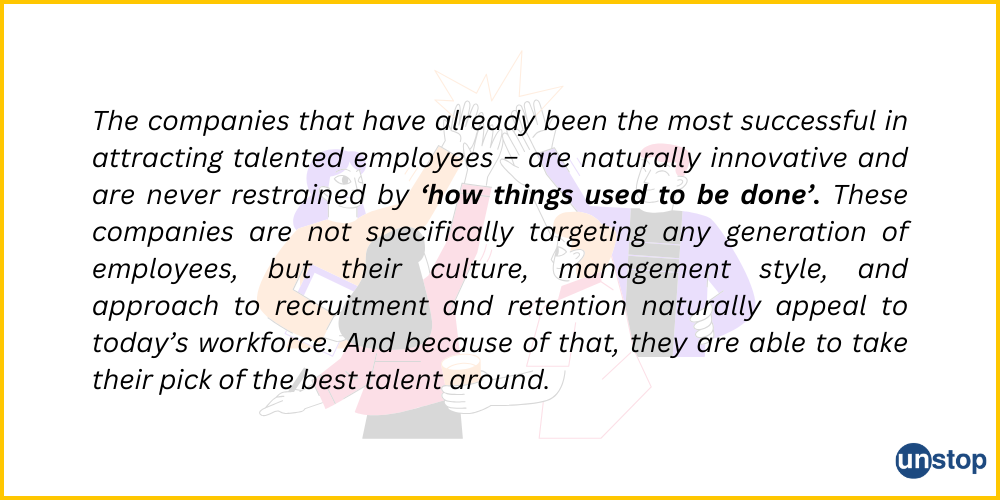
Managing a Multigenerational Workforce
In recent times, organizations have seen a shift in workforce demographics, with multiple generations working together. This presents a unique challenge for HR managers as they need to create a cohesive work environment that caters to the needs and expectations of different age groups. According to a survey by PwC, 45% of HR professionals find managing a multigenerational workforce challenging.
One of the main challenges in managing a multigenerational workforce is bridging the generation gap. Each generation has its own values, work styles, and communication preferences. For example, older employees may prefer face-to-face communication, while younger employees may prefer digital communication methods.
Another challenge is addressing the varying career expectations of different generations. HR managers need to provide opportunities for career growth and development that align with the expectations of each generation. This may involve implementing personalized career development plans, mentoring programs, or flexible work arrangements.
Adapting to Digital Transformation
Another significant challenge in HR management is adapting to digital transformation. With the rapid advancement of technology, HR departments need to adapt to new tools and platforms to streamline processes and enhance efficiency.
According to a study by Gartner, only 29% of HR leaders believe that their organizations are well-prepared for digital transformation.
As organizations increasingly integrate technology into their HR processes, several obstacles may arise:
- Resistance to Change: Employees and even HR professionals themselves may resist the adoption of new digital tools and technologies. The fear of job displacement, unfamiliarity with new systems, or general resistance to change can hinder the smooth transition to a digitally transformed HR environment.
- Skill Gaps: Implementing digital solutions often requires employees to acquire new skills. HR teams may face challenges in upskilling existing staff or hiring individuals with the necessary digital competencies. Bridging the gap between traditional HR practices and digital technologies is crucial for successful transformation.
- Data Security and Privacy Concerns: The digitalization of HR processes involves the collection and management of large amounts of sensitive employee data. Ensuring the security and privacy of this data is a significant challenge. HR professionals must navigate complex data protection regulations and implement robust cybersecurity measures to safeguard confidential information.
- Integration of Systems: Organizations may already have multiple HR systems in place, and integrating new digital tools with existing infrastructure can be challenging. Ensuring seamless communication and data flow between different platforms is crucial for maximizing the benefits of digital transformation.
- Costs and Budget Constraints: Investing in digital solutions and technologies can be expensive. HR departments may face challenges in convincing decision-makers to allocate budgetary resources for digital transformation initiatives. Demonstrating a clear return on investment (ROI) and long-term benefits is essential for securing financial support.
- Cultural Shift: A digital transformation often requires a cultural shift within the organization. HR professionals need to cultivate a culture that embraces innovation, continuous learning, and adaptability. Overcoming resistance and fostering a digital-friendly mindset among employees is vital for the success of the transformation.
Addressing these challenges requires a strategic and comprehensive approach involving collaboration between HR professionals, IT experts, and organizational leaders.
Mastering Effective HR Management: Tips For Overcoming Challenges
HR management involves a wide range of responsibilities, including recruitment, training, performance management, compensation and benefits, employee satisfaction, etc. By effectively managing these areas, HR professionals can create a positive work environment, attract and retain top talent, and contribute to the overall success of the organization.
Top 10 Things for HRs to Ace in 2024
Tip #1: Embrace Technology
In 2024, HR professionals need to stay updated with the latest HR technology trends. This includes utilizing AI-powered recruitment tools and implementing cloud-based HR systems. Successful digital transformation in HR involves not only the adoption of new technologies but also the cultivation of a supportive culture and the continuous improvement of processes.
Embracing technology is essential, but ensuring data privacy and confidentiality is equally crucial when handling employee information. HR departments must take the necessary steps to protect sensitive data from unauthorized access. For this, implementing strong security measures, such as encryption and access controls, is important.
Tip#2: Enhance Employee Experience
HRs should prioritize creating a positive and engaging employee experience. This involves focusing on employee well-being, providing opportunities for growth and development, and building a supportive work environment.

Tip#3: Foster Diversity and Inclusion
In 2024, diversity and inclusion will continue to be crucial for organizations. HR professionals should actively promote diversity in recruitment, create inclusive policies and practices, and provide diversity training to employees. To effectively manage a multigenerational workforce, HR managers can consider implementing cross-generational mentoring programs. This allows employees from different generations to learn from each other's experiences and perspectives. By fostering collaboration and knowledge sharing, organizations can create a more inclusive and productive work environment.
Tip#4: Upskill and Reskill Employees
The future of work demands continuous learning and upskilling. HRs should identify skill gaps within their workforce, provide relevant training programs, and support employees in acquiring new skills to stay competitive.
Tip#5: Strengthen Employer Branding
HR professionals need to focus on building a strong employer brand to attract top talent. This involves showcasing the company's culture, values, and benefits, as well as leveraging social media and online platforms for employer branding initiatives.
Spruce up your image! Build your employer brand with Unstop. Click here and explore
Tip #6: Develop Flexible Policies
With the rise of flexibility in work, HRs must establish clear policies and procedures for working from home, work hours, special leaves, etc. This includes defining expectations, ensuring effective communication and collaboration, and addressing potential challenges associated with flexible work.
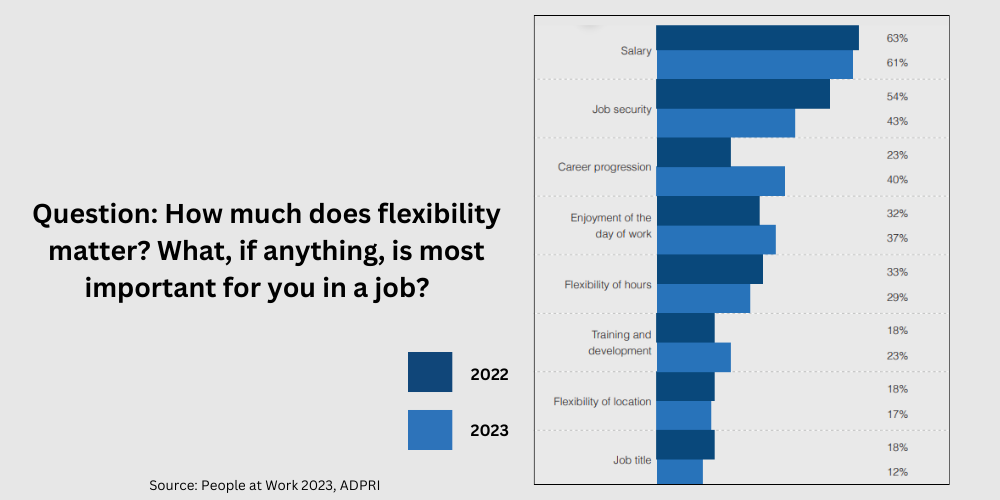
Tip#7: Implement Agile Performance Management
Traditional performance management systems are evolving towards more agile approaches. HRs should adopt continuous feedback mechanisms, goal-setting frameworks, and regular performance conversations to enhance employee performance and development.
Tip#8: Prioritize Mental Health Support
Employee well-being, including mental health, should be a top priority for HRs in 2024. Implementing mental health programs, providing access to counseling services, and promoting work-life balance can contribute to a healthier and more productive workforce. Employers should not overlook the importance of
educating managers and other employees about mental health issues and training them on how to support co-workers whose mental health is suffering.
As per the recent survey by ADP Research Institute, Gen Zs feel stressed 13 times per month on average compared to 10 times for all workers of older generations. However, they’re least likely to say that their employer is doing nothing to support mental health at work.
Tip#9: Shift to Data-Driven Decision-Making
By leveraging data, HR professionals can gain valuable insights into employee performance, turnover rates, and recruitment metrics. This information allows them to make informed decisions and optimize their strategies for better business outcomes. The data-driven approach also helps in recognizing employees' strengths and weaknesses, enabling targeted training programs to enhance their skills.
Tip#10: Embrace Automation
Automation tools play a significant role in streamlining HR processes. From payroll to leave management and performance reviews, HR automation streamlines tasks. Software crunches numbers, eliminates paperwork, and tracks progress digitally, saving time for everyone so that HRs can focus on what truly matters - the people.
Summing Up
Apart from the above points, staying updated with labor laws, regulations, and industry standards is essential for maintaining compliance in HR practices. Laws regarding employee rights, benefits, and workplace safety can change over time. HR teams need to stay informed about these changes to ensure they are adhering to the latest guidelines.
Effective HR management requires the ability to explore and find new ways to handle people and their concerns. A supportive, inclusive, and empowering workplace is essential to attracting and retaining talent. Although there is no absolute solution to HR challenges, companies can learn to show that they value their staff, care about their wellbeing, and understand the challenges they may be facing in their work and personal lives.
Suggested Reads:
As a biotechnologist-turned-writer, I love turning complex ideas into meaningful stories that inform and inspire. Outside of writing, I enjoy cooking, reading, and travelling, each giving me fresh perspectives and inspiration for my work.
Login to continue reading
And access exclusive content, personalized recommendations, and career-boosting opportunities.
Subscribe
to our newsletter
Blogs you need to hog!
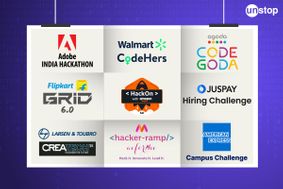
Organize Hackathons: The Ultimate Playbook With Past Case Studies

What is Campus Recruitment? How To Tap The Untapped Talent?
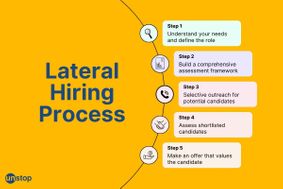
Lateral Hiring: A Complete Guide To The Process, Its Benefits, Challenges & Best Practices
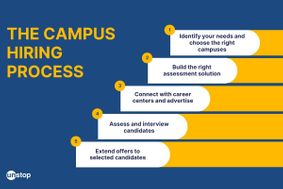











Comments
Add comment